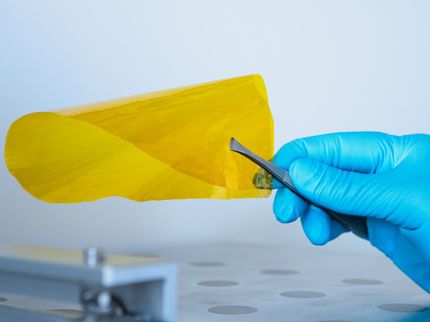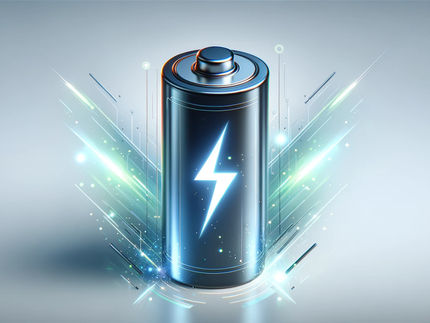Environmentally friendly and cost-effective electrolysers thanks to new MEA
Up to 95 percent less iridium, no PFAS: Spin-off elementarhy achieves first successes
Advertisement
A membrane electrode assembly (MEA) developed at the Leibniz Institute for Plasma Science and Technology (INP) in Greifswald, Germany can save up to 95 percent of the rare metal iridium in electrolysers. The technology also eliminates the use of per- and polyfluorinated chemicals (PFAS), making it more environmentally friendly. The innovative product solution convinced the German Federal Ministry for Economic Affairs and Climate Action to provide financial support for the establishment of a company to further develop and market the new process.
In the future, climate-neutral hydrogen will cover the energy needs of industry and serve as a storage medium for electricity from solar and wind power plants. Hydrogen production requires electrolysers that split water into hydrogen and oxygen. Electrolysers use iridium, one of the rarest natural elements, which results in high costs. Given the massive increase in demand, the German Mineral Resources Agency anticipates a supply risk and considers a significant increase in iridium production unlikely.
Additionally, PFAS chemicals are used in commercially available electrolysers. These substances, known as persistent chemicals, accumulate in nature and in living organisms and are considered a major health risk. The EU is currently negotiating far-reaching PFAS bans and industry is urgently seeking alternatives.
Cost and environmental benefits from innovative membrane electrode assembly
"Plasma technology has enabled us to create a new type of membrane electrode assembly for electrolysers. This means that up to 95 percent of the precious metals iridium and platinum can be saved during production. This is a decisive cost advantage and, in view of the scarcity of iridium, helps to scale up green hydrogen production," explains Dr Gustav Sievers, Managing Director of the new spin-off elementarhy of the Leibniz Institute for Plasma Science and Technology. "We also test our MEAs before delivery. Until now, faulty MEAs could only be detected during assembly, which is very labour-intensive. Another big advantage is that we are already working without PFAS in the key component, the catalyst layer. The PFAS-free coating of our MEAs makes the systems much more environmentally friendly.”
Sievers developed the process together with an international team of researchers at the INP. To produce the membrane electrode assembly, they use a combined process of plasma technology and electrochemistry based on a patented electrocatalyst for coating. This not only significantly reduces the amount of raw materials required, but also increases durability.
The membrane electrode assembly is the central element of a water electrolyser based on proton exchange membranes. The semi-permeable membrane is surrounded by water. When an electrical voltage is applied to the membrane electrode assembly, water is split and protons migrate across the membrane. Hydrogen is produced at the negatively charged cathode and oxygen at the positively charged anode.
Spin-off from INP: elementarhy achieves first successes
To market the new electrolysis technology, Dr Gustav Sievers, Arne Birth, Dr Martin Rohloff, Dr Zahra Nasri and André Pacheco founded elementarhy GmbH on 15 May 2024. With small-scale industrial production, the team has already received its first orders and delivered customised membrane electrode assemblies. The innovative technology is to be scaled up in further projects with electrolyser manufacturers and hydrogen producers.
Prof Dr Klaus-Dieter Weltmann, Chairman of the Board and Scientific Director at INP, comments: "At INP we develop innovative solutions for socially and economically important technologies. If we are convinced of the commercial potential of the discoveries, we support our researchers in setting up their companies. The spectrum of our six spin-offs so far ranges from medical products to measurement systems. I wish the elementarhy team every success with their innovative technology.”
Support programmes for young entrepreneurs
Since 1998, the German government has been supporting spin-offs from scientific institutions through the EXIST programme. The programme, run by the Federal Ministry for Economic Affairs and Climate Action, is co-funded by the European Social Fund. According to the Federal Ministry for Economic Affairs and Climate Action, the EXIST research transfer funding programme supports "outstanding research-based start-up projects that involve complex and high-risk development work". The Federal Ministry for Economic Affairs and Climate Actions funding for elementarhy amounts to a total of €1.2 million, of which the INP will contribute ten percent. The funding started in April 2023 and will run for two years.
The young company received further recognition and funding of €50,000 when it was awarded the Leibniz Founder Prize 2024. The elementarhy team is now using this start-up funding to drive forward the development of market-ready production systems and the commercialisation of the new technology.
Other news from the department science
Most read news
More news from our other portals
Something is happening in the chemical industry ...
This is what true pioneering spirit looks like: Plenty of innovative start-ups are bringing fresh ideas, lifeblood and entrepreneurial spirit to change tomorrow's world for the better. Immerse yourself in the world of these young companies and take the opportunity to get in touch with the founders.































































